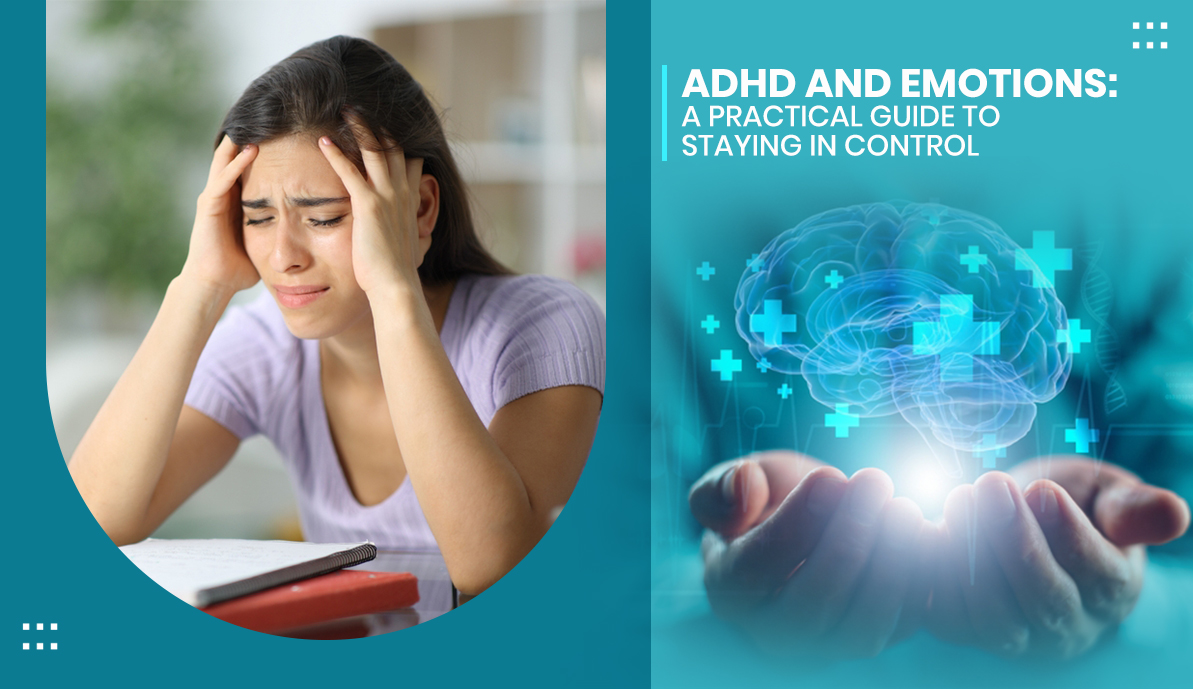ADHD(Attention-Deficit/Hyperactivity Disorder) is regarded as a neurodevelopmental disorder. It is also clearly visible in adults. People who suffer from ADHD face difficulty in directing and controlling their attention. According to doctors, ADHD creates issues controlling one’s emotions, a condition called emotional dysregulation.
As per clinical studies, up to 70 percent of adults with ADHD syndrome face emotional dysregulation. More than half of ADHD adults suffer from anxiety, and nearly half have been treated for depression at some point in their lives. Therefore, it is critical to get a diagnosis of ADHD from the right place. Furthermore, ADHD is also associated with fits of uncontrollable rage. It lasts for a prolonged period in Adults, and affects individuals in their professional life, daily life activities, and interpersonal relationships.
As an ADHD patient, individuals need to understand the link that exists between emotional dysregulation and ADHD. It helps individuals develop more compassion for themselves. This blog talks about the causes, symptoms, diagnosis, and also talks about how to regulate emotions within your loved ones who suffer from ADHD.
What are the causes of ADHD?
The specific causes of ADHD are still unknown to doctors. According to research and studies, evidence of genetic influence has been under high consideration. The medical experts often believe that genetics may have a direct link with ADHD. As the cause of ADHD, no specific gene or combination of genes has been identified. Some believe that several genes can cause the disorder.
According to collected evidences, anatomical differences are found between the brains of adults with ADHD and those without it. According to studies, ADHD affects the frontal lobes, cerebellar vermis, and caudate nucleus of the brain.
Gene is not the only specific factor, but is regarded as a critical one. Further, a few non-genetic factors do lead to this disorder, such as exposure to toxic substances, stress during the pregnancy period, low birth weight, and premature birth. Whatever the cause may be, numerous treatment options are available to control this disorder. Buy premium quality medicine under the guidance of an expert doctor from Meds Magic.
Symptoms of ADHD Found Among Adults
Adults who have ADHD can never focus on one task for a prolonged period. They do get distracted from their work very easily. It is not a temporary symptoms among the adults who has ADHD. It persists for a prolonged period and gradually worsens, becoming increasingly serious over time. The symptoms can change over time and become more serious in adults as they age. It may turn them restless. Some of the symptoms found in adults are as follows.
- Trouble staying in order and organized
- Cannot keep behavior under control
- A feeling of restlessness and Impatience
- Failure in maintaining social relationships
- Random mood swings
- Challenges in managing daily tasks
- Problem with focus and attention
- Delay in task completion
Adults who are suffering from ADHD are mostly impulsive by nature. They do face communication difficulties. Adults with ADHD syndrome do get really restless and aggressive at times.
Diagnosis of ADHD In Adults
ADHD symptoms are common among adults. Some adults who suffer from ADHD are left untreated for life because of a lack of awareness. The symptoms include difficulty managing tasks at home and in the office. ADHD also affects one’s emotional stability. Symptoms worsen as adults age, making them extremely restless by nature. It becomes more severe with age.
Currently, lab tests aren’t available for ADHD. Symptoms happen to be the same in at least two different environments, so general symptoms must not be mistaken for ADHD. Most doctors often diagnose ADHD by observing several aspects of behavior and development minutely.
What’s the connection between strong emotions and ADHD?
Among adults, emotions are a healthy and natural part of life. Emotion regulation is involved in how you exactly perceive and express emotions. When you plan to control your emotions, you can work towards your goals regardless of how you feel.
Emotional regulation consists of five processes.
- Do attempt to choose situations that minimize your negative emotions while increasing your positive ones.
- Managing what you can in a specific scenario.
- Focus on the entire aspects of a situation that make you feel good.
- Re-evaluating situations that often upset you
- Do change actions that are solely based on negative emotions and may make things worse for you
- With ADHD, the actions involved in emotional regulation may not occur automatically, resulting in emotional dysregulation
It further means that you are unable to adjust your emotional state to achieve your clear-cut objectives. Emotions within the adults who suffer from ADHD do get heightened by impulsivity and executive functioning issues.
Further, impatience, frustration, and fury may:
- appear suddenly
- be intense
- last a long time
As per mental health analysis, Emotion regulation deficiencies (ERD) within adults suffering from ADHD have been discovered in around 34- 70 % of adults. An investigation of emotional dysregulation discovered three types:
- Emotional reactivity/negativity/liability (ERNL).
- Emotional recognition and understanding (ERU).
- Empathy/callous-unemotional traits (ECUT)
Furthermore, emotional dysregulation is mostly common in people with ADHD, particularly in the area of emotional reactivity.
The link between ADHD and these areas of emotional dysregulation grows stronger as you age. Adults with ADHD may experience emotional dysregulation, which can lead to misunderstandings in social relationships. It appears to be the cause of the significant symptoms of ADHD. However, if you have both ADHD and difficulty controlling your emotions, you are more likely to face the challenges than if you only have ADHD with concentration and impulsive symptoms.
How to Regulate Emotions with ADHD?
According to preliminary medical studies, individuals who address emotional dysregulation concerns, particularly during therapy, tend to have better outcomes. Therefore, we have compiled six emotional management practices for adults who suffer from ADHD. You should consult a reputable doctor. If your doctor prescribes medicines like Artvigil, Modalert, Modasmart, and Waklert, you can buy them from Meds Magic. All our medicines are FDA-approved. Under the advice of a medical professional, follow the strategies that work the best for you.
Learn the Skill of Self-Monitoring
Try to examine yourself in both neutral and emotional settings. Ask yourself specific questions, such as – How quickly do you react? How would you categorize your emotions? Do your reactions help you achieve your objectives? Does your mood generally remain neutral, or do you tend to have an irritable streak? Several individuals with emotional dysregulation struggle to identify their emotions. Self-monitoring is the first step toward properly treating this disease.
Take Care of Your Physical Health
Sleep deprivation has a harmful effect on all adults who suffer from ADHD. Adults often tend to hide their feelings. It is natural within adults that when we are sleepy, hungry, hot, cold, or sick, we become just as irritable as toddlers. As a result, get ample sleep, exercise regularly, and be mindful of what you consume. You can definitely support your psychological well-being and enhance your ability to cope with stress by maintaining your physical health.
Acquire ADHD Knowledge and Coping Strategies
As per research, as a person suffering from ADHD symptoms improves, so does their ability to regulate their emotions. When ADHD symptoms stop interfering with your life, you will definitely have very few reasons to get upset.
Kindly read ADHD books and participate in online forums. Do everything you can to reduce the overall emotional impact that ADHD has on your life.
Stay Grounded
When we remain stressed, we often have negative thoughts in our minds. We are concerned about the future and linger on the adverse events of the past. You can always avoid being swept away by negative thoughts by anchoring yourself in the current moment.
Intensely focus on your five senses and pay close attention to the environment around you, the next time you find yourself thinking about the past or the future.
Do consider practicing guided meditation. Start a daily mindfulness practice to prevent various unpleasant thoughts and emotions from spiraling out of control in the future.
Consider medication
Still, research in this field is already ongoing, and initial findings suggest that medication does aid with emotional dysregulation.
Since untreated ADHD symptoms can increase the number of stressors a person can cope with, treating those symptoms with doctor-prescribed stimulant medicine from Meds Magic, like Artvigil (150 mg, 250 mg, 50 mg), Modalert (100 mg, 200 mg, 400 mg), Modasmart (400 mg), and Waklert (150 mg, and 50 mg) can bring improvement in your emotional well-being.
It is recommended to even consult with a healthcare professional for a private ADHD assessment. They can help you with the medication above that addresses your specific cluster of symptoms.
ADHD Therapy Can Assist You in Better Managing Your ADHD
As an adult, you may have given up on better controlling your ADHD symptoms. You need to strongly figure out how to improve your performance while still feeling good about yourself with the help of a certified doctor.
Final Thoughts
Adult who suffers from ADHD symptoms generally require attention and planning from their loved ones to make their lives better and order them what they want from them. Furthermore, ADHD never has any kind of specific definition of emotional dysregulation or heightened emotions. Adults do suffer from various types of difficulties if they have ADHD. Therefore, to keep yourself healthy, eliminating negative thoughts and engaging in physical exercises are simple techniques for redirecting intense emotions. If your loved ones suffer from this disease, then you can avail doctor-prescribed and FDA-approved medicines from Meds Magic today.



